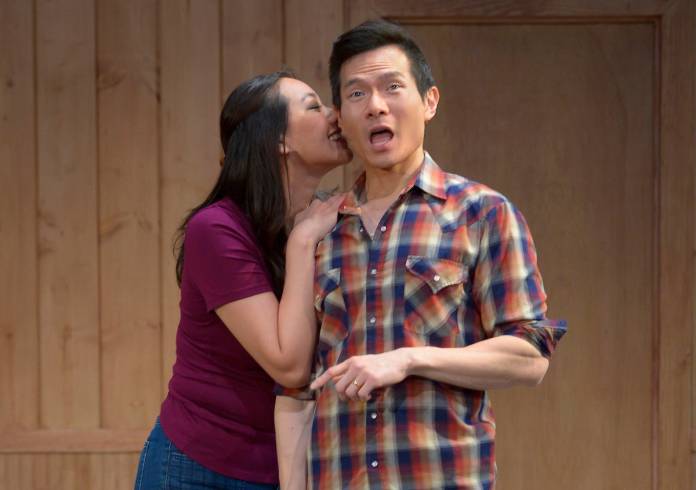ONSTAGE “You lost a brother, I lost my family. You lost a brother, I lost my whole country… I lost everything I had.”
With this scathing refrain, Quang (James Seol), a fighter pilot turned refugee, reminds an anti-war hippie (one of many roles played by the excellent thespian-chameleon Jomar Tagatac) that Americans will never know as much about the war as the Vietnamese who endured it on their native soil.
There are many facets to the Vietnam War—or the American War as the Vietnamese now call it, to distinguish it from invasions of their country by the Chinese and French over the centuries. In A.C.T.’s new “irreverent road trip comedy” Vietgone (through April 22), playwright Qui Nguyen has chosen to look at it from one particular perspective: the Vietnamese who sided with the Americans, and who escaped the fall of Saigon by the skin of their teeth to come to the United States.
Lives intersect in 1975 at the Ft. Chafee, Arkansas refugee camp. Quang, a helicopter pilot trained at Lackland Air Force Base in Texas, commanded a unit for the South Vietnam Air Force for eight years. Tong (Jenelle Chu), the woman he falls for in the refugee camp, worked at the US Embassy and was granted two tickets out. To her regret, her younger brother Khue (Stephen Hu, in one of his many roles) will not join her because he won’t leave the love of his life. At his urging, she brings their mother Huong (the delightfully caustic Cindy Im), who is unabashedly vocal about her disgust with the camp’s food, the incomprehensible language, and most especially the GI who is smitten with her daughter.
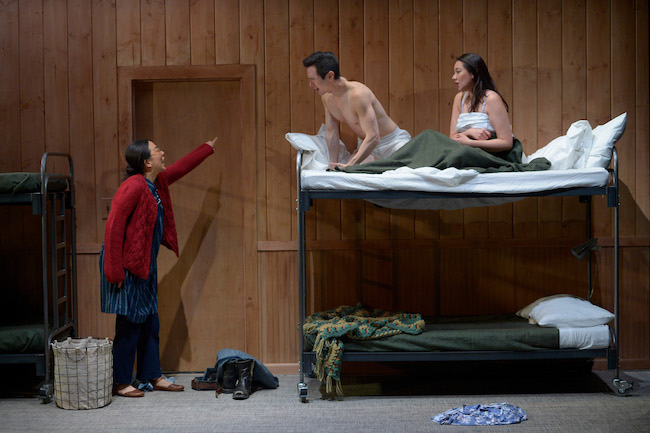
Given the tragedy of their lives—years of war, forced separation from loved ones, landing on a distant and unfamiliar shore, confinement in a camp in the middle of nowhere—it’s quite a feat that playwright Nguyen and director Jaime Castaneda have created an exuberant comedy that has the audience roaring out loud at many moments.
Nguyen’s skillful play with language is nothing short of brilliant. In the opening scene, an actor representing the playwright (Tagatac) explains how the dialogue will be presented. When the Vietnamese characters are speaking to each other, it will be in familiar, contemporary language, even raps, that the audience can easily follow: “Whoa, there’s a lotta white people up in here?” When an American attempts Vietnamese, it will be awkward and grammatically incorrect: “Seeing you for first time was love in sight first.” And when the Americans speak English to the Vietnamese it is a jumble of common words sounding like total gibberish: “Nascar, botox, frickles.”
As the play unfolds, the purpose of Nguyen’s linguistic gymnastics becomes clear: English-speaking audiences have to grapple with what it feels like not to understand the language that surrounds you in a strange place, and maybe share some deeper understanding of what it means to be a war refugee.
Nguyen has created the opposite of the classic Hollywood Vietnam War films, where the heroes are all Americans and the Vietnamese are minor characters, exoticized and stereotyped, and mostly silent. In Vietgone, the narrative is defined by the Vietnamese, and the Americans have the walk-on parts.
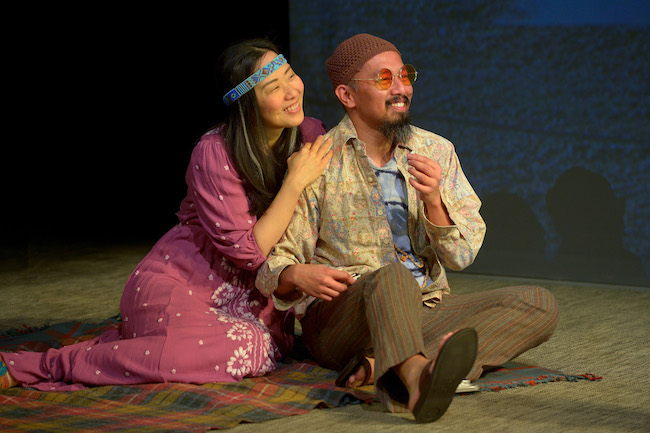
The first act is snappy. We witness the fall of Saigon, the chaotic departure of many Vietnamese on helicopters and aircraft carriers, and their arrival in the bleak resettlement camp. The scenes go back and forth in rapid-fire sequence from Vietnam to America, aided by black and white projections of the war.
The main characters are irreverent and compelling. The beautiful Tong rejects her many suitors and asserts she is the “sheer opposite of every Vietnamese woman on the planet”—she doesn’t want to be protected or taken care of, she wants to strike out on her own in her new country. “I’m no Juliet waiting on no balcony,” she raps, “I can save my own kingdom, I’m a badass bitch!”
Her mother Huong resents—after burying two husbands, birthing eight children, and surviving two wars—having to learn English, and thinks the Americans should learn Vietnamese. Until they do, she delights in voicing her obscenity-laced opinions in front of Americans who don’t understand a word of her insults and think of her as a sweet old lady.
Quang resists being seduced by America, “I don’t want to think about where I am, a soldier lost in some foreign land.” He is obsessed about getting back to his wife and two children in Vietnam. Yet he continues to defend the US role in the war even though he knows that in this new country he will be subject to racism: “We get to America by any desperate means/Cause they say they’ll take the poor and the weak/But does that do for refugees that look like me/peeps reminding them of their enemy?”
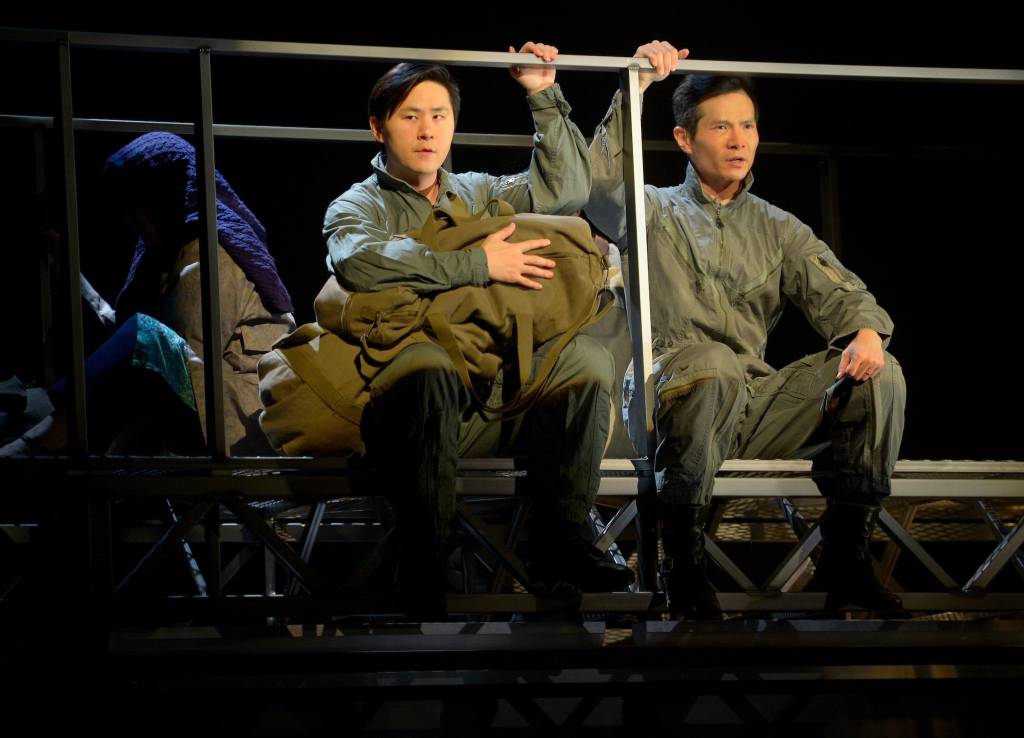
The drama, and the humor, slow somewhat in the second act as the characters reluctantly settle in to their new circumstances, knowing it will be for the long haul.
Nguyen said in an interview that growing up in Arkansas with Vietnamese refugee parents, he loved hip-hop, action movies, and comic books. These cultural influences are evident here: the music by composer Shammy Dee features dynamic raps, the set design by Brian Sidney Bembridge includes huge brightly-colored comic-book style letters announcing places and dates, and several scenes are reminiscent of movies that run the gamut from Dirty Dancing and Easy Rider to Revenge of the Ninja. Even Nguyen’s brilliant inversion of syntax and language echoes that technique in the groundbreaking film The Ballad of Gregorio Cortez.
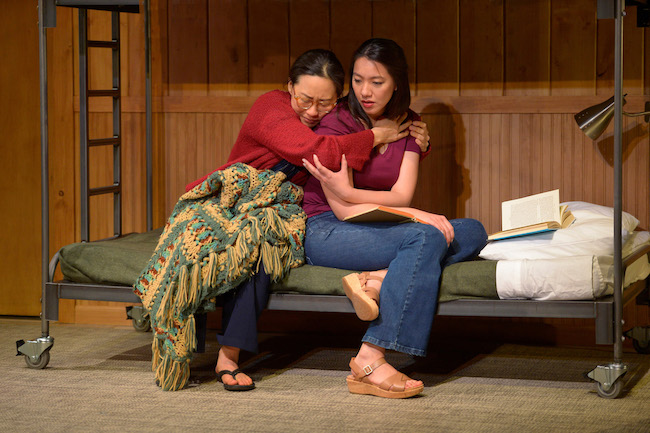
Director Castaneda says, “A lot of my colleagues and I are part of a whole generation of artists who are either first- or second-generation American, who straddle different countries and different identities. It’s in that tension that we’ve seen a lot of new cultural productions grappling with race, identity, culture and history… asking questions about their place in this country, their place in the world.”
The playwright claims in his opening speech that “this story is not about war, but about falling in love.” That assertion is reiterated later in the play when he tries to convince his father, Huang, now a septuagenarian, to talk to him about the war. Huang, speaking in broken heavily accented English to his American-born son, only wants to share his memories of his child’s babyhood and teenage years.
Driving home from the theater, we heard news on the radio that a vet who had been treated for PTSD at a Yountville veterans’ home had taken three women staff members hostage, and then shot and killed them. That tragedy underscored the message of Vietgone, which, despite the actor/playwright’s on-stage denials, is a story about the deep consequences of war—just not the ones we thought we knew.
VIETGONE
Through April 22
A.C.T. at Geary Theatre, SF
Tickets and more info here.

